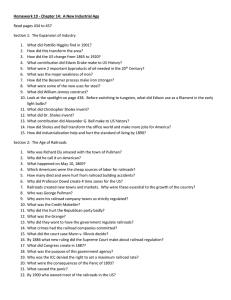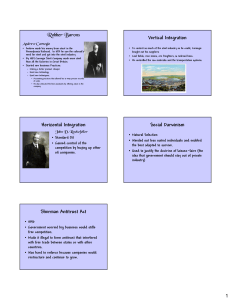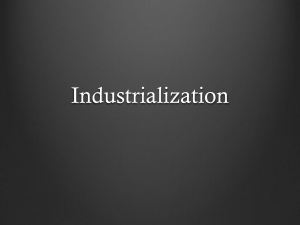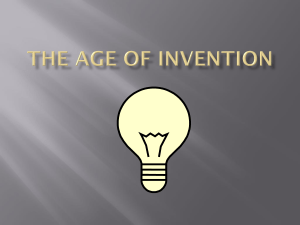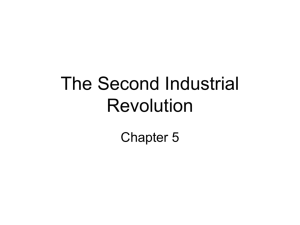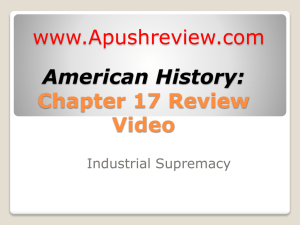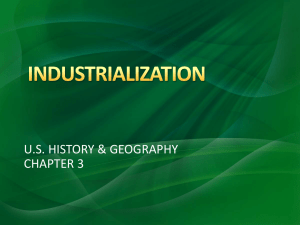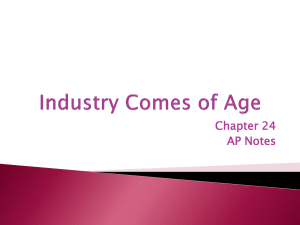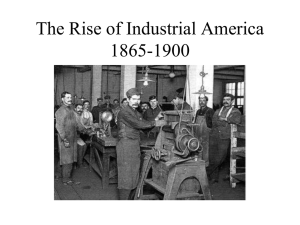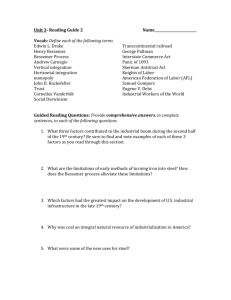Chapter 6 Vocab - Moore Public Schools
advertisement
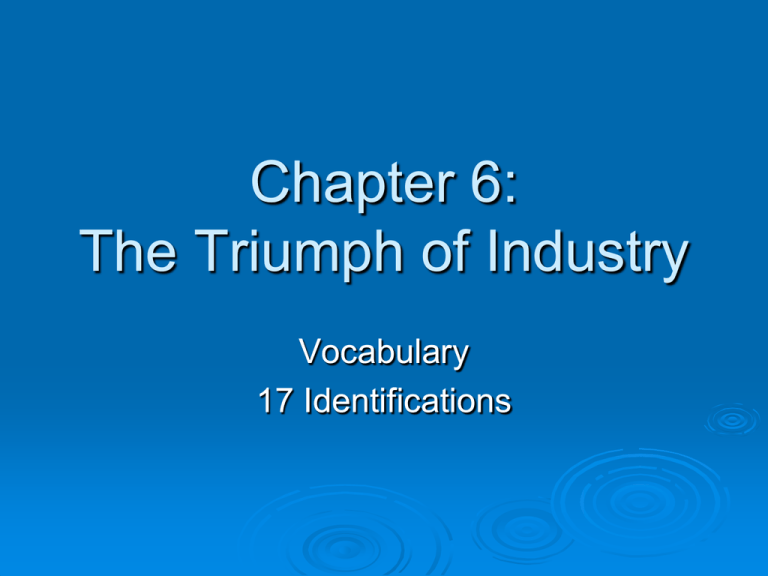
Chapter 6: The Triumph of Industry Vocabulary 17 Identifications Edwin Drake Part I: 1859-Drake drilled the first oil well near Titusville, Pennsylvania. Part II and III on your own. Samuel F.B. Morse Perfected telegraph technology. Alexander Graham Bell Invented the telephone, revolutionizing both business and personal communication In 1877 he organized the Bell Telephone Company which eventually became the American Telephone and Telegraph Company (AT&T). Thomas Edison Most famous inventor of the late 1800s Had a research lab at Menlo Park, NJ, which would become the forerunner of the modern research lab. Inventions included the phonograph, the light bulb, the electric generator. 1882-the Edison electric Illuminating Company launched a new industry and began the transformation of American society when it began to supply electricity to customers in NYC. 1889-Edison General Electric Company formed, which became General Electric (GE). Bessemer Process English Inventor, Henry Bessemer invented a new process for making high quality steel efficiently and cheaply. Motivated Andrew Carnegie to concentrate his investments into the steel industry. Laissez-faire Literal translation: French for “let do” meaning let people do as they choose. Supporters of laissez-faire believe the government should not interfere with the economy other than to protect private property rights and maintain peace. Part II and III on your own. Andrew Carnegie Steel Industry; Carnegie Steel Industry Cut his prices until he drove his competitors out of business, allowing him to control the steel industry. Controlled all aspects of the steel industry from the mines that produced iron ore to the shipping and rail lines necessary for transportation (vertical integration). Preached a “gospel of wealth”/ philanthropy John D. Rockefeller Standard Oil company As he made more money, he was able to undersell his competitors. Created the idea of a “trust”; a new kind of monopoly. J.P. Morgan American financier, banker and art collector who dominated corporate finance and industrial consolidation during his time. Social Darwinism Based on Darwin’s theory of evolution Society should do as little as possible to interfere with people’s pursuit of success. If the government would stay out of business, those who were most “fit” would succeed and become rich. Society would benefit from the success of the fit and the weeding out of the unfit. Part II and III on your own. Great Railroad Strike of 1877 1st nationwide labor protest Panic of 1873 forces many companies to cut wages. July 1877, several railroad companies announce another round of wage cuts. Railroad workers across the country walked off the job, and angrily smashed equipment, tore up tracks, and blocked rail service. Many governors called out state militias to stop the violence. President Hayes ordered the army to open the railroad. Haymarket Square Riot 1886-organizers organized a nationwide strike on May 1 calling for an 8-hour workday. On May 3 a clash between strikers and police left one striker dead in Chicago. A meeting was organized in Chicago’s Haymarket Square to protest the killing. When police entered the square, someone threw a bomb. The police opened fire and workers shot back. 7 police officers and 4 workers were shot. The Pullman Strike A strike of the American Railway Union of Pullman Cars that threatened to paralyze the economy. Railroad managers attached mail cars to the Pullman cars. President Cleveland then sent in troops claiming that it was his responsibility to keep mail running. Samuel Gompers/ AFL Samuel Gompers was the first leader of the American Federation of Labor. Made up from over 20 of the nations trade unions. 3 goals: gain recognition and collective bargaining closed shops (only union members hired) 8 hour workday By 1900 it was the biggest union in the country. Sherman Anti-Trust Act 1890-Congress passed this law to outlaw any combination of companies that restrained interstate trade or commerce. i.e. monopolies, trusts, etc… Proved ineffective against trusts, because the government rarely enforced it and the law’s vague language made it hard to apply in court. Also, the law was used against labor unions. Socialism/ Eugene Debs An economic and political philosophy that favors public (or social) control of property and income, not private control. Socialists believe that society at large, not just private individuals should take charge of a nation’s wealth. The wealth of a nation should be distributed to everyone. Eugene Debs was an important leader of the socialist party and labor organizer.
